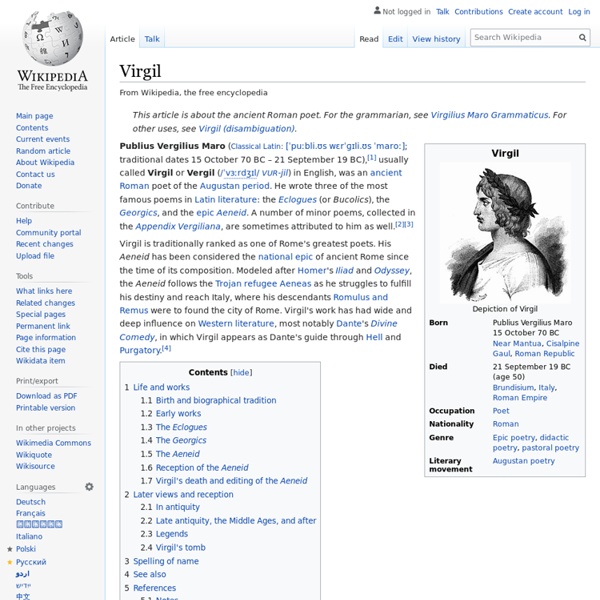Ovid
Life[edit] Ovid talks more about his own life than most other Roman poets. Information about his biography is drawn primarily from his poetry, especially Tristia 4.10, which gives a long autobiographical account of his life.
Augustan poetry
In Latin literature, Augustan poetry is the poetry that flourished during the reign of Caesar Augustus as Emperor of Rome, most notably including the works of Virgil, Horace, and Ovid. In English literature, Augustan poetry is a branch of Augustan literature, and refers to the poetry of the 18th century, specifically the first half of the century. The term comes most originally from a term that George I had used for himself. He saw himself as an Augustus.
Aeneid
The hero Aeneas was already known to Greco-Roman legend and myth, having been a character in the Iliad. Virgil took the disconnected tales of Aeneas's wanderings, his vague association with the foundation of Rome and his description as a personage of no fixed characteristics other than a scrupulous pietas, and fashioned the Aeneid into a compelling founding myth or national epic that tied Rome to the legends of Troy, explained the Punic Wars, glorified traditional Roman virtues, and legitimized the Julio-Claudian dynasty as descendants of the founders, heroes, and gods of Rome and Troy. The Aeneid is widely regarded as Virgil's masterpiece[3][4] and one of the greatest works of Latin literature.[5][6] Story[edit] The Aeneid can be divided into two halves based on the disparate subject matter of Books 1–6 (Aeneas's journey to Latium in Italy) and Books 7–12 (the war in Latium). Journey to Italy (books 1–6)[edit]
en.m.wikipedia
Aeneas recounting the Trojan War to Dido, a painting by Pierre-Narcisse Guérin. This scene is taken from Virgil's Aeneid, where Dido falls in love with, only to be left by, the Trojan hero Aeneas. Dido ( DY-doh; Ancient Greek: Δῑδώ, Latin pronunciation: [ˈdiːdoː]) was, according to ancient Greek and Roman sources, the founder and first queen of Carthage. She is primarily known from the account given by the Roman poet Virgil in his epic Aeneid.
Late Middle Ages
Period of European history between 1250 and 1500 CE From the Apocalypse in a Biblia Pauperum illuminated at Erfurt around the time of the Great Famine. Death sits astride a lion whose long tail ends in a ball of flame (Hell). Famine points to her hungry mouth. The Late Middle Ages or Late Medieval Period was the period of European history lasting from 1250 to 1500 AD. The Late Middle Ages followed the High Middle Ages and preceded the onset of the early modern period (and in much of Europe, the Renaissance).[1]
Roman Republic
Period of ancient Roman civilization (509–27 BC) The Roman Republic (Latin: Rēs pūblica Rōmāna, Classical Latin: [ˈreːs ˈpuːblɪka roːˈmaːna]) was the era of classical Roman civilization beginning with the overthrow of the Roman Kingdom, traditionally dated to 509 BC, and ending in 27 BC with the establishment of the Roman Empire. It was during this period that Rome's control expanded from the city's immediate surroundings to hegemony over the entire Mediterranean world. Roman society under the Republic was a cultural mix of Latin, Etruscan, and Greek elements, which is especially visible in the Roman Pantheon. Its political organisation was strongly influenced by the Greek city states of Magna Graecia, with collective and annual magistracies, overseen by a senate.[4] The top magistrates were the two consuls, who had an extensive range of executive, legislative, judicial, military, and religious powers.
Apollonius of Rhodes
ancient Greek epic poet Apollonius of Rhodes (Ancient Greek: Ἀπολλώνιος Ῥόδιος Apollṓnios Rhódios; Latin: Apollonius Rhodius; fl. first half of 3rd century BCE), was an ancient Greek author, best known for the Argonautica, an epic poem about Jason and the Argonauts and their quest for the Golden Fleece. The poem is one of the few extant examples of the epic genre and it was both innovative and influential, providing Ptolemaic Egypt with a "cultural mnemonic" or national "archive of images",[1] and offering the Latin poets Virgil and Gaius Valerius Flaccus a model for their own epics. His other poems, which survive only in small fragments, concerned the beginnings or foundations of cities, such as Alexandria and Cnidus places of interest to the Ptolemies, whom he served as a scholar and librarian at the Library of Alexandria. Life[edit] Sources[edit]
simple.m.wikipedia
The death of Dido by the German painter, Heinrich Friedrich Füger Ancient Greek and Roman writers said that Dido was the founder and first Queen of Carthage. Carthage was a city in the country now known as Tunisia. Dido lived in the 9th century BC (about 3000 years ago).



